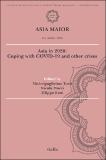Files in this item
Myanmar 2020 : elections in a pandemic
Item metadata
| dc.contributor.author | Fumagalli, Matteo | |
| dc.date.accessioned | 2021-11-09T16:31:06Z | |
| dc.date.available | 2021-11-09T16:31:06Z | |
| dc.date.issued | 2021-08-04 | |
| dc.identifier | 273873139 | |
| dc.identifier | dac40c1b-9ce0-4c60-a0f7-2202c22183aa | |
| dc.identifier | 85114160784 | |
| dc.identifier.citation | Fumagalli , M 2021 , ' Myanmar 2020 : elections in a pandemic ' , Asia Maior , vol. XXXI , pp. 259-273 . < https://www.asiamaior.org/the-journal/asia-maior-vol-xxxi-2020/myanmar-2020-elections-in-a-pandemic.html > | en |
| dc.identifier.issn | 2385-2526 | |
| dc.identifier.other | ORCID: /0000-0002-1451-2088/work/103137680 | |
| dc.identifier.uri | https://hdl.handle.net/10023/24301 | |
| dc.description.abstract | The year 2020 in Myanmar was not substantively different from that of so many other countries. The year was dominated by the Covid-19 pandemic, its socio-economic impact and the government’s attempt to cushion its effect and fight against it. The authorities sought to seal off the country from the spread of the Coronavirus from March onwards and managed to contain the first wave quite successfully. After the summer, though, the country experienced a surge in cases and deaths, also among migrant workers abroad. In their efforts to provide relief and support to households and businesses, the authorities were assisted by donors, international financial institutions and key allies such as China. Yet, the impact was severe. Two other issues were also of great significance. Parliamentary elections were held on 8 November. The National League for Democracy (NLD) secured another landslide victory again, just like in 2015. Aung San Suu Kyi’s star status domestically remains unchanged and was boosted by her appearance at the International Court of Justice (ICJ) hearings in 2019 and during the pandemic. At the same time, more than a vote for the NLD per se, the vote appeared to be the reflection of what the party stood against: the military. The Tatmadaw’s protests during the campaign and after the elections lay the ground for an escalation of the tensions between the two. The clashes in Rakhine state between the Arakan Army and the Myanmar army intensified up to the point that the parliamentary and local elections had to be cancelled in some townships. A Japan-brokered ceasefire later in the year opened the way for negotiations and gives some cause for optimism for reducing hostilities and violence. | |
| dc.format.extent | 1575104 | |
| dc.language.iso | eng | |
| dc.relation.ispartof | Asia Maior | en |
| dc.subject | Myanmar | en |
| dc.subject | Elections | en |
| dc.subject | Covid-19 | en |
| dc.subject | Asia | en |
| dc.subject | Pandemic | en |
| dc.subject | Rakhine | en |
| dc.subject | Aung San Suu Kyi | en |
| dc.subject | Burma | en |
| dc.subject | Conflict | en |
| dc.subject | NLD | en |
| dc.subject | JQ Political institutions Asia | en |
| dc.subject | JZ International relations | en |
| dc.subject | 3rd-DAS | en |
| dc.subject | SDG 16 - Peace, Justice and Strong Institutions | en |
| dc.subject.lcc | JQ | en |
| dc.subject.lcc | JZ | en |
| dc.title | Myanmar 2020 : elections in a pandemic | en |
| dc.type | Journal article | en |
| dc.contributor.institution | University of St Andrews. School of International Relations | en |
| dc.contributor.institution | University of St Andrews. Institute of Middle East, Central Asia and Caucasus Studies | en |
| dc.description.status | Peer reviewed | en |
| dc.date.embargoedUntil | 2021-11-09 | |
| dc.identifier.url | https://www.asiamaior.org/the-journal/asia-maior-vol-xxxi-2020/myanmar-2020-elections-in-a-pandemic.html | en |
This item appears in the following Collection(s)
Items in the St Andrews Research Repository are protected by copyright, with all rights reserved, unless otherwise indicated.

